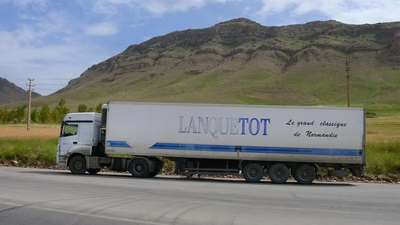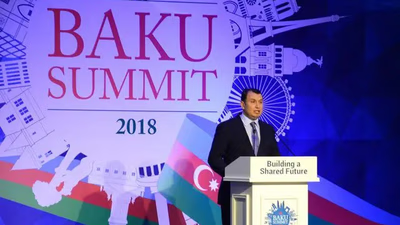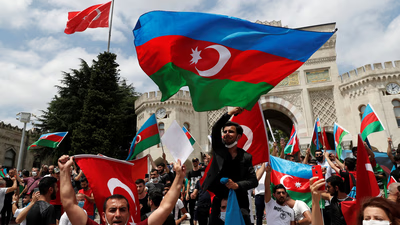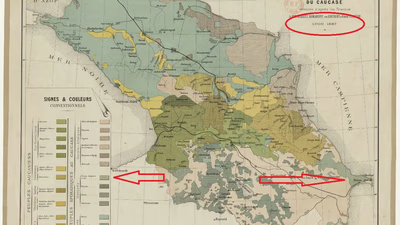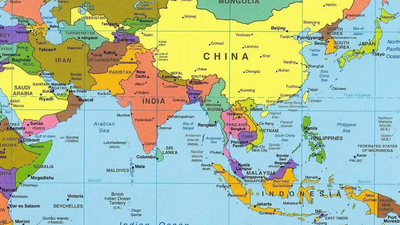
Azerbaijan"s trade landscape: oil exports and economic diversification. "
Although the Government of the Republic of Azerbaijan has made diversification in the economic sectors and strengthening of the non-oil sector as the main priorities in the development strategy for this year, many of the investments of this country are still due to the continued dominance of oil and gas in the country's economy. The oil-rich Republic of Azerbaijan, as a country in South-Central Asia and the Caspian Sea, located between countries such as Iran, Russia, and a small part of Europe, is of special importance in the Caucasus region, which has economic relations with neighboring countries. It is of special importance.
Looking at the reliance of the country's economy over the years, we find that the country's first export product was oil, which, with the conclusion of foreign contracts and the entry of powerful foreign companies, invested more than $ 60 million in the long term in the oil-rich regions of the country. According to Trend, petroleum products account for more than 90 percent of the country's exports, as well as the oil and gas industry based on oil price fluctuations, in the range of 33 to 50 percent of its gross domestic product.
In recent years, the country's authorities have significantly improved the investment climate by strengthening the regulatory and operational environment for corporate activities, ranking 25th last year in terms of ease of doing business. It is ranked 57th in 2018.
Recently, Reuters reported that the stated goal of the Republic of Azerbaijan is to make foreign direct investment, except for coal, oil, and natural gas (50% of foreign direct investment between 2003 and 2017), towards infrastructure and Industry including mining, metallurgy, and cement is gone.
Reuters added: "While Azerbaijan's infrastructure is of high quality compared to other Eurasian and middle-income countries, it ranks poorly in the World Bank's logistics performance index, ranked 123rd out of 167 countries, because Soft commercial infrastructure, including the performance of transport operators, the customs sector and the quality of logistics services in the country is poor. Therefore, railway networks need to be modernized and maintenance costs increased. While Azerbaijan's infrastructure is of high quality compared to other Eurasian and middle-income countries, it ranks poorly in the World Bank's 123rd out of 167 countries.
The trend also said that border crossing projects are the government's top priorities and make up most of Azerbaijan's transport investments, but that more focus on secondary and local roads could improve internal communication and reduce costs of travel.
Although the Government of the Republic of Azerbaijan, as an oil-producing country, has made economic diversification and strengthening of the non-oil sector the main priorities in its development strategy for this year, many of its investments continue to dominate oil and gas. The energy and economy sectors are more widely supported, for example, current plans to invest in wind projects, although significant, are being ignored compared to oil and gas projects.
Looking at the reliance of the country's economy over the years, we find that the country's first export product was oil, which, with the conclusion of foreign contracts and the entry of powerful foreign companies, invested more than $ 60 million in the long term in the oil-rich regions of the country. According to Trend, petroleum products account for more than 90 percent of the country's exports, as well as the oil and gas industry based on oil price fluctuations, in the range of 33 to 50 percent of its gross domestic product.
In recent years, the country's authorities have significantly improved the investment climate by strengthening the regulatory and operational environment for corporate activities, ranking 25th last year in terms of ease of doing business. It is ranked 57th in 2018. Recently, Reuters reported that the stated goal of the Republic of Azerbaijan is to make foreign direct investment, except for coal, oil, and natural gas (50% of foreign direct investment between 2003 and 2017), towards infrastructure and industry including mining, metallurgy, and cement is gone.
Reuters added: "While Azerbaijan's infrastructure is of high quality compared to other Eurasian and middle-income countries, it ranks poorly in the World Bank's logistics performance index, ranked 123rd out of 167 countries, because soft commercial infrastructure, including the performance of transport operators, the customs sector and the quality of logistics services in the country is poor. Therefore, railway networks need to be modernized and maintenance costs increased.
While Azerbaijan's infrastructure is of high quality compared to other Eurasian and middle-income countries, it ranks poorly in the World Bank's 123rd out of 167 countries. Border crossing projects are the government's top priorities and make up most of Azerbaijan's transport investments, but that more focus on secondary and local roads could improve internal communication and reduce costs of travel. Although the Government of the Republic of Azerbaijan, as an oil-producing country, has made economic diversification and strengthening of the non-oil sector the main priorities in its development strategy for this year, many of its investments continue to dominate oil and gas. The energy and economy sectors are more widely supported, for example, current plans to invest in wind projects, although significant, are being ignored compared to oil and gas projects.
Over the past few years, Azerbaijan has lacked a coherent strategy for a strong focus on the environment and, most importantly, a sufficient time horizon to assess the synergies and trade exchanges associated with various infrastructure investments. Institutional changes of the Republic of Azerbaijan in connection with the merger of the Ministry of Transport with the Ministry of Communications and High Technologies in 2017 and the dissolution of the State Agency for Alternative and Renewable Energy Resources in 2019, the situation of transport and energy in this country (Which are the main parts of the infrastructure) has weakened. Overall, the energy sector is of better quality in terms of infrastructure than other strategic sectors, but the country's power transmission and distribution systems have performed poorly compared to neighbors such as Georgia.
The energy sector is better in terms of infrastructure than other strategic sectors, but the country's power transmission and distribution systems have performed poorly compared to neighbors such as Georgia. According to the report of the Nordea trade site, according to the updated forecasts of the International Monetary Fund from mid-April 2020, while the GDP of Azerbaijan amounted to 2.3% in 2019, it is expected to decline by 2.2% by the end of this year due to the current corona crisis and to grow by 0.7% in 2021.
According to the report, despite issues such as government debt, which is expected to reach 18.6 percent in 2020 compared to 19.7 percent in 2019, as well as high reliance on hydrocarbons, reduced oil production (25 percent less For the past six years), and a weak banking system that refuses to lend in local currency to avoid exchange rate risk, in addition to the problem of corruption that remains unresolved and may be an obstacle to the country's development, a strong government fund The development of the Caspian gas field, the increase in exports to Turkey and Europe, the geographical connection between China and Europe and the positive public business environment are among the positive points of this country located in the South Caucasus.
With the help of dozens of foreign companies, including the British BP, Azerbaijan is developing its oil and gas resources in the Caspian Sea and alone produces more than five times as much oil from the Caspian Sea as other coastal countries. The office of the ruling party of New Azerbaijan announced in 2019 that the oil reserves in the Caspian Sea and its land resources are equivalent to 4 billion tons and natural gas is 2.6 trillion cubic meters. Public investment in the country is generally focused on projects such as the Shah Deniz gas field in the Caspian Sea (the National Iranian Oil Company is a shareholder in the Shah Deniz gas field development project) and the TANAP Trans-Anatolian pipeline, while economic diversity is also seen in industries such as cotton, tourism, fruits and vegetables, and vehicles.
According to SOFAZ, oil and gas exports accounted for more than 95% of the revenues of the Republic of Azerbaijan in 2018, and the revenue of the State Oil Fund of the Republic of Azerbaijan from the management of oil and gas revenues amounted to six billion and 300 million dollars per year. The past has been reported. Also, the total revenue of oil and gas projects in the Caspian Sea in 2019 is equal to 154 billion and 600 million dollars.
However, in recent years, the development of non-oil sectors has been followed by the liberation from high dependence on revenues from the energy sector and the diversification of various sectors of the economy through the development of infrastructure for the development of entrepreneurship and business. But sometimes he also thinks about the huge revenues that come from the implementation of oil and gas projects and prioritizes the implementation of these projects. Among them, the contract for the development of the Azeri, Cheragh, and Gunshli oil fields between the Republic of Azerbaijan and foreign oil companies has been extended until 2050. The 2019 budget shows that not only has the dependence on oil revenues not been reduced but also that Elham Aliyev has provided for the country's financial needs through the export of natural gas.
